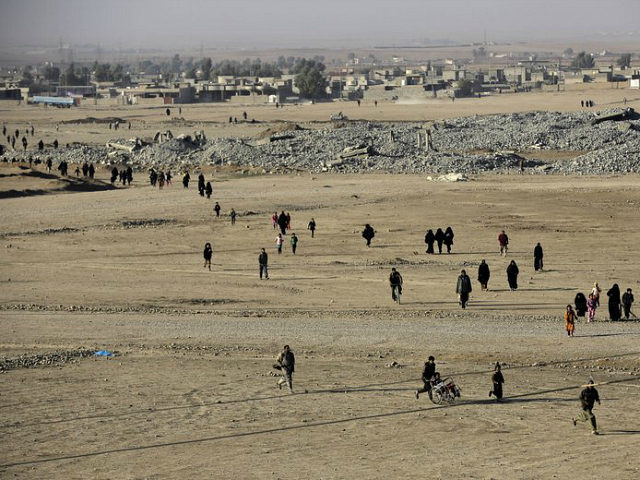The good news from the latest report by the United Nations Office for the Coordination of Humanitarian Affairs is that 94,500 Iraqis have returned to their homes in the besieged city of Mosul. The bad news is that 392,000 of them left, producing a net refugee crisis of some 300,000 displaced civilians.
The Associated Press reports many of the displaced oare currently living in “large refugee camps just outside the city.” The majority of them hail from western Mosul, where the Islamic State is still in control.
Iraqi News reports an estimate from provincial authorities that 90 percent of displaced residents from the eastern part of the city have returned home as ISIS is pushed back into the western portion of the city. An adviser to the governor said that restoring electricity, water, and schools persuaded many of the refugees that life could return to normal if they went home, although many are still understandably fearful of the Islamic State’s penchant for shooting at civilians or using them as human shields.
A Reuters report from March chronicled the efforts of Iraqi intelligence officers to ferret ISIS militants out of the refugee population:
The intelligence officer, who spoke to Reuters on condition of anonymity, said he had extracted seven suspected Islamic State members on Sunday, the first day of mass displacement from western Mosul. Reuters saw four more in detention on Monday.
“The fighters don’t come out,” he said. Those who were loyal to the jihadist movement but played a less public, mainly non-combatant role are more likely to try to slip through the dragnet, the intelligence officer added.
Security forces keep on hand some local Mosul inhabitants they refer to as “sources” to help them identify suspects.
[…] The intelligence officer said he had learned to pinpoint IS associates from how they behaved with him.
“You can tell because they are afraid. Those who are not Daesh are also afraid but it’s different from the fear of those who are with Daesh,” he said, without elaborating, using an Arabic acronym for Islamic State.
According to this Iraqi intelligence officer, the city’s residents were so horrified after years of Islamic State occupation that they eagerly point out militant infiltrators and recount their crimes. However, a U.S. intelligence official quoted in the Reuters piece said some ISIS combatants did manage to escape in the chaos of battle around Mosul and Raqqa, the Islamic State’s capital in Syria.
The U.N. High Commissioner for Refugees reports that displaced persons are still streaming out of western Mosul, obliging the government to open a new refugee camp south of the city:
IDPs [Internally Displaced Persons] are fleeing areas recently retaken by the Iraqi Security Forces (ISF), and areas of west Mosul still under armed groups’ control. Although the government and some NGOs are distributing food in a small number of retaken neighborhoods in west Mosul, lack of food and potable water reportedly remains a considerable challenge for civilians in west Mosul.
Some reported that they hadn’t had access to potable water for up to 45 days. IDPs from areas still under armed groups’ control interviewed by UNHCR highlighted the enormous risks taken during their flight, including targeting by snipers and IEDs.
About 5,000 IDPs from west Mosul arrived at camps in the northeast of Mosul last week. Between 24 and 30 March, 826 families displaced from west Mosul were transferred from Hammam Al-Alil to Nargizlia 2 camp, some 35 km northeast of Mosul. This represented a 50 percent increase in transfers from Hammam Al-Alil to camps northeast of Mosul, compared to the previous week.
Last week, U.N. Secretary General Antonio Guterres called for more international aid to assist people fleeing from Mosul. “We don’t have the resources necessary to support these people,” said Guterres.

COMMENTS
Please let us know if you're having issues with commenting.